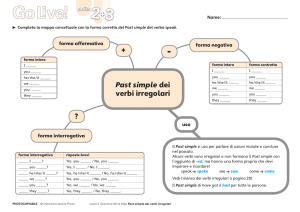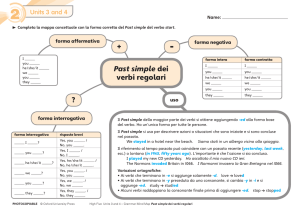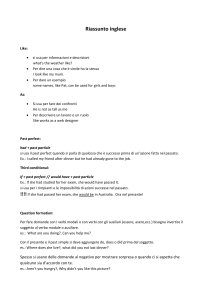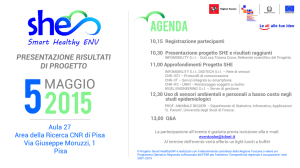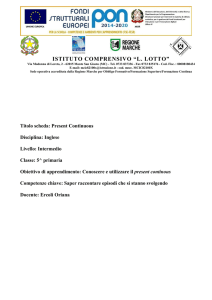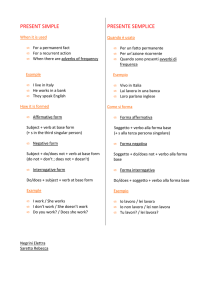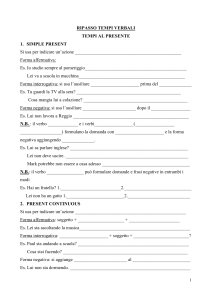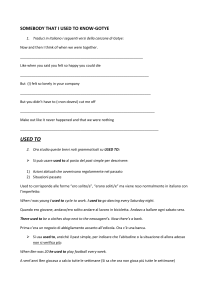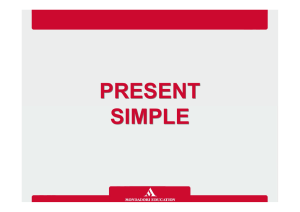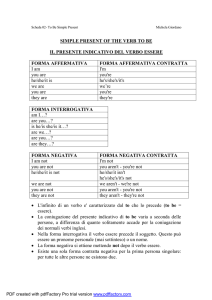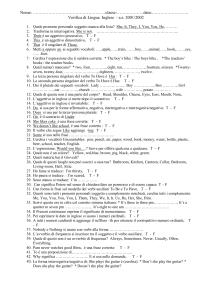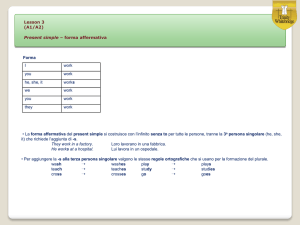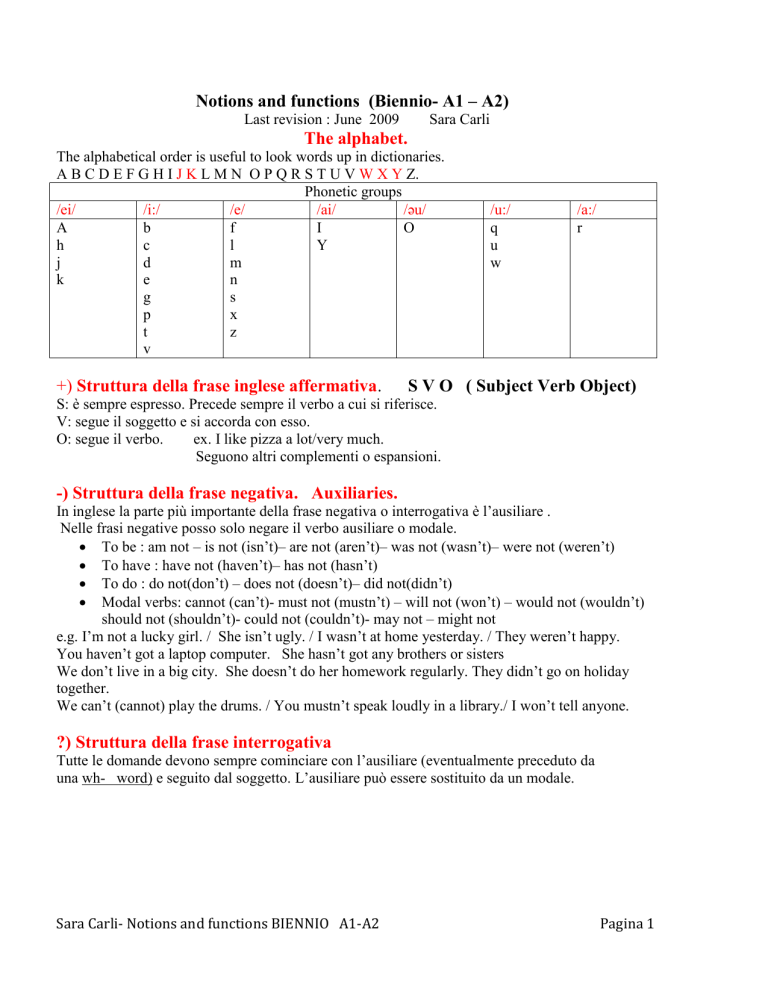
Notions and functions (Biennio- A1 – A2)
Last revision : June 2009
Sara Carli
The alphabet.
The alphabetical order is useful to look words up in dictionaries.
A B C D E F G H I J K L M N O P Q R S T U V W X Y Z.
Phonetic groups
/ei/
/i:/
/e/
/ai/
/əu/
A
b
f
I
O
h
c
l
Y
j
d
m
k
e
n
g
s
p
x
t
z
v
+) Struttura della frase inglese affermativa.
/u:/
q
u
w
/a:/
r
S V O ( Subject Verb Object)
S: è sempre espresso. Precede sempre il verbo a cui si riferisce.
V: segue il soggetto e si accorda con esso.
O: segue il verbo.
ex. I like pizza a lot/very much.
Seguono altri complementi o espansioni.
-) Struttura della frase negativa. Auxiliaries.
In inglese la parte più importante della frase negativa o interrogativa è l’ausiliare .
Nelle frasi negative posso solo negare il verbo ausiliare o modale.
To be : am not – is not (isn’t)– are not (aren’t)– was not (wasn’t)– were not (weren’t)
To have : have not (haven’t)– has not (hasn’t)
To do : do not(don’t) – does not (doesn’t)– did not(didn’t)
Modal verbs: cannot (can’t)- must not (mustn’t) – will not (won’t) – would not (wouldn’t)
should not (shouldn’t)- could not (couldn’t)- may not – might not
e.g. I’m not a lucky girl. / She isn’t ugly. / I wasn’t at home yesterday. / They weren’t happy.
You haven’t got a laptop computer. She hasn’t got any brothers or sisters
We don’t live in a big city. She doesn’t do her homework regularly. They didn’t go on holiday
together.
We can’t (cannot) play the drums. / You mustn’t speak loudly in a library./ I won’t tell anyone.
?) Struttura della frase interrogativa
Tutte le domande devono sempre cominciare con l’ausiliare (eventualmente preceduto da
una wh- word) e seguito dal soggetto. L’ausiliare può essere sostituito da un modale.
Sara Carli- Notions and functions BIENNIO A1-A2
Pagina 1
Wh-words
Who
Where
When ( what time)
Why
What *
what colour
what time
what kind of …
Which *
Whose
How *
How old
How much
How many
Chi
Dove
Quando ( a che ora)
Perché
che cosa, quale
di che colore
a che ora
che tipo di
quale (ambito + ristretto)
di chi
come
quanti anni
quanto-a / quanto costa
quanti-e
WH-WORDS + AUXILIARY + SUBJECT + VERB ( + preposition)
Who
Why
What
Where
What colour
Which wine
Whose CD
is / was
are
are
do/ did
does
do
is
Auxiliaries
to be
to have
to do
that girl ?
They
You
You
She
You
it ?
late ?
doing ?
live?
prefer?
like best ?
Modals (present –past)
can - could
must/have to – had to
will
would
shall
should= ought to
could
may – might
might
Tutti I verbi modali si costruiscono allo stesso modo. Costruzione di can.
(+) S + modal + V ( infinito senza to)
She can swim .
(-) S + modal + not + V ( infinito senza to)
She can’t swim.
(?) Modal + S + V ( infinito senza to)
Can she swim ?
Sara Carli- Notions and functions BIENNIO A1-A2
Pagina 2
Modal CAN : Functions: 1. asking for permission Can I go out, please?
2. making a request
Can you lend me your pen, please?
3. expressing abilities
I can swim and sing very well.
Personal information. (FUNCTIONS)
Ask and give information about: name, age, marital status, job, hobbies, place of living, family,
free time activities . See pair works
Simple present
S + bare infinitive (infinito senza to)
Use: habits, routines ( azioni abituali e continuative) vs Present continuous for ongoing activities
Do e does si usano nelle frasi negative, interrogative, nelle risposte brevi e negli altri impieghi
degli ausiliari.
Like ( costruzione personale) e.g. She likes portraits. She likes painting them.
Il verbo LIKE non è usato alla forma in –ing , ma è SEMPRE seguito, nel caso di un
secondo verbo, dalla forma in –ing.
Would like + verb = conditional
Il verbo LIKE, nell’uso condizionale, col significato di VORREI,è sempre seguito da TO +
infinito
In offers: Would you like some biscuits ? Yes, please.
I would like to go to the seaside.
Verbs for the routine
get up – have breakfast / eat – get dressed – leave home – take/catch the bus ( walk / drive to
school) –arrive at school ( See verb lists)
GO ( verbo di movimento) regge la preposizione TO
Spelling irregularities
Words ending in s,ss,sh,ch,x,o, + es
Both plural nouns and verbs (3rd person singular)
Noun -singular Plural noun
Base form – verb
3rd person singular
simple present
bus
kiss
splash
watch
box
potato
miss
wash
watch
fax
go
misses
washes
watches
faxes
goes
buses
kisses
splashes
watches
boxes
potatoes
Noun -y
boy
lady
Plural noun
-VY
-CY
Noun –f
wife / housewife
boys
ladies
Base form: verb 3rd person singular
-y
-y
play
-VY
Plays
fly
-CY
Flies
Plural –ves
wives / housewives
Sara Carli- Notions and functions BIENNIO A1-A2
Exceptions: chefs
Pagina 3
knife/ penknife
life
leaf
knives / penknives
lives
leaves
cliffs
dwarfs
roofs
Irregular plurals
man- men : uomo
tooth-teeth : dente
woman-women: donna
foot- feet : piede
child- children : bambino/figlio
person – people
mouse- mice : topo
louse – lice : pidocchio
goose-geese : oca
Spelling -ing form
Doubling final consonant in monosyllabic words : swim – swimming
Silent e : write – writing come -coming
i / y si conservano ski – skiing play – playing study - studying
Eccezioni : i/y
: die- dying lie-lying
run-running
Present continuous
(+) S ( am,is,are) V ing
( - ) +not
( ?) ( -wh) am,is,are +S + V ing ?
It is used to describe on going activities (1) or arranged plans (future events) (2).
(1) She is singing now.
(2) They are going out tonight.
Short answers
(+) Yes, S Auxiliary
( always full form = mai forma contratta)
(-) No, S Auxiliary+not
( always short form = sempre forma contratta)
Il soggetto è sempre un pronome personale soggetto
Are you a student ? Yes, I am. / No, I’m not. (I’m a teacher)
Is she married ? Yes, she is. / No, she isn’t. (She’s single)
Have you got a moped ? Yes, I have. / No, I haven’t.
Has she got a dog ? Yes, she has. / No, she hasn’t.
Can she sing ? Yes, she can. / No, she can’t.
Can they drive? Yes, they can. / No, they can’t
to do Do you play football ? Yes, I do. / No, I don’t.
Does she often listen to music ? Yes, she does. / No, she doesn’t.
Past
Did you see John ? Yes, I did. / No, I didn’t.
Did she wait for you ? Yes, she did. / No, she didn’t.
Have you been abroad ? Yes, I have. / No, I haven’t.
Has she bought a new mobile ? Yes, she has. / no, she hasn’t.
Future Will you do me a favour ? Yes, I will. / No, I won’t.
Will she leave tomorrow ? yes, she will./ No, she won’t.
Are you going to study Spanish ? Yes, I am. / No, I’m not.
Is it going to rain ? Yes. it is. / No, it isn’t.
to
be
to
have
can
Sara Carli- Notions and functions BIENNIO A1-A2
Pagina 4
Prepositions of place
In front of: davanti
Behind: dietro
Opposite: dall’altro lato
Here: qui
There: là
Over there: laggiù
Prepositions of movement
To , into, towards She is going to the mountain
There is – There are
There was – There were
They are used in descriptions. (FUNCTIONS)
Se il primo elemento, anche in un elenco, è SINGOLARE si usa THERE IS; se il primo elemento è
PLURALE, si usa THERE ARE.
e.g. There is a sofa and two armchairs in the sitting room.
There are two armchairs and a sofa in the sitting room.
Location on a PICTURE:
* (at the) top left
* in the CORNER
(at the) top right *
(in the) centre
*( at the) bottom left
(at the) bottom right
*
Demonstratives ( adjectives and pronouns)
this : questo-a
that : quello-a quel
these : questi-e quei
those : quelli-e quegli
Idioms with to be
Be (cold, hot, warm)
: avere freddo, caldo
Be (hungry , thirsty, sleepy, in a hurry): avere fame, sete, sonno, fretta
Be right, wrong, afraid of
: avere ragione, torto, paura
Introductions (FUNCTIONS)
This is …
Informal: Nice to meet you / Pleased to meet you
Formal . How do you do – How do you do.
The time
A quarter, past. to.
I usually sleep six hours and a half / six and a half hours.
Adverbs of frequency ( used with the simple present)
- (Never ever) never seldom/rarely sometimes usually often always +
Position: She always goes to school on time. She’s never late for school.
Express frequency:
How often do you go to the cinema?
Precise frequency:
Once a week / Twice a month.
Sara Carli- Notions and functions BIENNIO A1-A2
Pagina 5
Adjectives with negative prefixes ( see file on adjectives)
Gli aggettivi PRECEDONO SEMPRE il sostantivo a cui si riferiscono e sono INVARIABILI.
A red car, two red cars ... a tall boy, some tall boys … an unfriendly person, some unfriendly
people
Quantities Some( affirmative/ offers, requests) – Any ( negative, ordinary requests).
+ ) a lot of lots of
- ?) much many
Enough = abbastanza
Position: AFTER VERBS.
Do you sleep enough ?
BEFORE NOUNS Do you get enough sleep ?
Asking for help/meaning
Could you repeat, please?
What’s the English for …
It’s
How do you say /call that in English ?
What does it mean ? It means …
What’s the meaning of …?
Countable nouns
Uncountable nouns
banana, peach, tomato, doughnut
_________________________________
bananas, peaches, tomatoes, donuts,
coffee, tea, sugar, milk, meat, fish, yoghurt
money
homework
housework
Personal pronouns subject – object . Possessie adjectives - pronouns
In tutti i tempi, con tutti i verbi (tranne il modo imperativo) il pronome personale soggetto è
sempre espresso.
(+) (-) Il soggetto si trova sempre prima del verbo nelle frasi affermative o negative
(? Il soggetto si trova sempre dopo l’ausiliare e prima della forma base
del verbo nelle frasi interrogative
Personal
pronoun
subject
Personal
pronoun
object
Possessive
adjectives
Possessive
pronouns
Reflexive
pronouns
I
you
he
she
it
we
you
they
me
you
him
her
it
us
you
them
my
your
his
her
its
our
your
their
mine
yours
his
hers
myself
yourself
himself
herself
itself
ourselves
yourselves
themselves
Sara Carli- Notions and functions BIENNIO A1-A2
ours
yours
theirs
Pagina 6
TO HAVE
1. possess
I have a car
2. auxiliary
Have you read the paper ?
3. lexical verb
She doesn’t have breakfast = she doesn’t eat in the morning
Costruzione particolare di have (+ meals)
Quando il verbo avere non ha il significato di possedere, si costruisce come un qualsiasi verbo
lessicale
Have breakfast = eat
She has breakfast every morning at 6.30
She doesn’t have breakfast on Sunday.
Does she have breakfast ?
Verbs ( categories )
Lexical or ordinary
Auxiliary
Modals
eat drink DO
be have DO
can could shall will should would must
may might ought to
Imperative
Orders - Strong advice - Prohibitions. Only 2nd person singular and plural.
-) Don’t talk! +) Be quiet!
Other forms : Let + personal pronoun object + base form. Let’s go ! Let me do it !
Greetings and introductions (FUNCTIONS)
At the beginning of a conversation
Informal
Formal
Hello – Hi
Good morning
good afternoon
good evening
At the end of a conversation
Informal
Formal
Bye
Good bye
See you soon /later/
good night
tomorrow/next week
Titles
Mr + surname
Sir
Gentlemen
Ms + surname ( A.E.) (when you do not know)
Mrs + surname ( married women)
Miss + surname (single women)
Madam
Ladies
Parting remarks (FUNCTIONS)
Take care
Drive carefully.
Don’t do anything I wouldn’t do.
Sara Carli- Notions and functions BIENNIO A1-A2
Pagina 7
English paradigm
Go
Base form
Imperative
+ ing = gerund
+ to be + ing form =
present continuous ( +ing)
( + s) = simple present
+ don’t/doesn’t = simple present
negative and interrogative
+ didn’t = simple past negative and
interrogative
+ would = conditional
+ modals
went
simple past affirmative
Gone
past participle
+ have/has = present perfect
+ had =past perfect
+ to be = all passive
forms
Simple past of to be ( Pattern: the same as the present)
was 1st -3rd singular
were 2nd singular – all plural
Where were you born ? I was born in London.
Simple past
Si usa per esprimere azioni concluse, non importa da quanto tempo.
L’importante è che il tempo sia specificato esplicitamente o che il contesto sia chiaro.
Tutti i verbi ordinari (lessicali) si dividono in regolari e irregolari.
Pronunciation of the suffix –ed
/t/ verbi che terminano con consonante sorda : / p, k, f, θ, s, ∫, t∫ /
/d/ verbi che terminano con consonante sonora o vocale : / b, g, v, δ, z, z, dz, l/
/t/
/d/
/id/
/p/ stopped, jumped
slipped, unwrapped
/k/ asked, thanked, parked,
liked, talked, marked
checked, walked, looked
/f/ photographed
/s/ passed /pa:st/
missed, noticed
/∫/ finished, washed,
pushed
/t∫/ watched, clutched
/b/ sobbed, robbed, climbed
/g/ begged
/v/ loved, arrived
/ δ/ breathed
/z/ buzzed
/l/ travelled, pulled, cycled
/m/ dreamed, mimed
/n/ listened, rained
/r/ covered, appeared
/v=vowel/ stayed, played
showed
Sara Carli- Notions and functions BIENNIO A1-A2
t/ started, collected,
wanted. acted, hated
/d/ ended, decided, added
Pagina 8
Thanking and responding to thanks (FUNCTIONS)
Thank you – thanks ( a lot) – thank you very much
You’re welcome ( A.E.)
My pleasure
Any time
That’s very kind of you
Past continuous
Use: on going activities in the past
Pattern: the same as the present continuous, replacing am-is with was and are with were.
ex, She was studying when her mobile phone rang.
See spelling –ing form above.
Prepositions of time
In
parts of the day ( morning
afternoon
evening)
months
seasons
years
centuries
+ places
on
precise date
days of the week
birthdays
celebrations (Xmas, Easter)
months + day
+ holiday
+ the right/left
+ the 2nd floor
+ a course
At
Christmas
Easter
n. address
(time) at 7.30
midday, midnight,
mealtime, night
on a school trip – on the phone – on business
We can also use THIS, NEXT, LAST, EVERY.
She’s leaving this July. They’re moving house next December.
Last
Yesterday
week, July, summer, year morning, afternoon,
night
evening
…Ago
seconds/minutes/moments
hours/days/months/years/
centuries
Other prepositions:
FOR: per /da (durata dell’azione)
SINCE: dal /per (momento iniziale dell’azione)
BY: entro
He’s often in bed by 10 o’clock.
UNTIL/TILL : fino a
FROM ... TO: dalle …alle She works from Monday to Saturday from 9 to 5.
Sara Carli- Notions and functions BIENNIO A1-A2
Pagina 9
Saxon Genitive or the possessive case
Costruzione tipica della lingua inglese, che mette in relazione un possessore ( animato NON
COSE) con una cosa posseduta.
Tom’s car. My sister’s name’s Sheila.
St. James’s park
Used also with time expressions : Today’s paper
Plural: 1) Regular plural: The students’ books
Irregular plural: The children ‘s toys
Present Perfect Simple
Auxiliary used : to have (always)
In question and negatives.
Pattern: S
HAVE
+ Past participle
(all forms except S = 3rd person singular : HAS )
Use: unfinished actions or events – Past experiences linked to the present
Comparative
and superlative
Monosillabi o Plurisillabi
bisillabi in y
fatter than
more interesting than
luckier than
more boring than
Monosillabi
bisillabi in y
the fattest
the laziest
o Plurisillabi
the most interesting
the most powerful
Irregular comparative and superlative
good/well better the best
bad worse the worst
far farther/further the further/the furthest
little less the least
much more the most
The weather (FUNCTIONS)
What’s the weather like ? It’s sunny ( rainy, cloudy , foggy, snowy)
Conditional sentences
Type 0
General truth
sub clause
if + present
main clause
present
Type 1
Probability/Prediction
if + present
will future
Type 2
Possible or imaginary situations
Type 3
if + simple past
(ED ) / 2 parad.
Impossibility
–
Improbable if + past perfect
situations which do not happen
had + Pa Pa
Sara Carli- Notions and functions BIENNIO A1-A2
present conditional
would + BF
past conditional
would have + Pa Pa
Pagina 10
T 0 : If I eat too much chocolate, I get spots
T 1 : If she eats too much, she’ll get fat
T 2 : If she ate too much, she would get fat.
T 3 : If she hadn’t eaten too much, she wouldn’t have got fat
Passive
TENSE
Simple present
Simple past
Present perfect
Present continuous
Future simple
Modal verbs
PASSIVE SENTENCE
English is spoken here.
English was spoken.
English has been spoken.
English is being spoken.
English will be spoken.
English can be spoken.
ACTIVE SENTENCE
People speak English here.
People spoke it yesterday.
They have spoken it.
They are speaking it.
They will speak English.
People can speak English.
Invitations
1. Why don’t we …
Why don’t we go for a pizza?
2. What/how about + V ing
How about having a snack?
3. Imperative: Let’s Verb …
Let’s go to the restaurant.
4. Shall we …
Shall we dance?
5. Can we go to …
Can we go to see a film?
6. Could we …
Could we have something to eat first?
7. Would you like to …
Would you like to go to the disco?
ACCEPTING. That’s a lovely/good/great idea!
REFUSING. I’m sorry but I don’t feel very well. Some other time
Relative clauses
defining
who
for PEOPLE
which
for THINGS
where for PLACES
whose for POSSESSIONS
non defining
People who /that live in Cornwall are
very friendly
which/that
Tintagel, which is a small
village, is a long way from a
big town
I know where you live
I met the girl whose friend I knew
Future time
WILL FUTURE
predictions
promises
on the spot decisions
GOING TO
intentions
imminent events (stare per)
PRESENT CONTINUOUS
arranged plans
near future
Sara Carli- Notions and functions BIENNIO A1-A2
Pagina 11
Duration form
Present perfect simple or continuous
Use: duration in the past up to the present
3 years ago I started playing soccer.
I played soccer for 3 years = I’m not playing anymore
I’ve played soccer for 3 years / I’ve been playing soccer since 2003 = I’m still playing it.
FOR: arco di tempo . I’ve been reading for an hour.
SINCE: da un momento preciso. He’s been waiting since 8 o’clock.
FOR
a short time
half an hour
one hour and a half
three days
days and days
four weeks
six months
a year
ages
SINCE
yesterday
last Wednesday
July
May 25th
last summer
1989
he was a child
I started school
she was born
Tail questions – tag questions or question tags. For confirmation
You aren’t going to call the police, are you ?
Sally and I have never met before, have we ?
You like Chinese food , don’t you ?
That wasn’t a very good film , was it ?
She forgot to buy some bread, didn ‘t she?
Echo questions
Per esprimere interesse o stupore
I’m working part time
I live in London
I went to the theatre yesterday
Are you ?
Do you ?
Oh, did you ?
Opposite adjectives ( see file on adjectives)
weak strong
sad=miserable=unhappy
light dark
light heavy
happy=glad=pleased
Adjectives and adverbs
Regular
angry / angrily
bad / badly
careful / carefully
loud / loudly
quick/ quickly
Position: adjectives before nouns ; adverbs after verbs
Irregular
early
late
good / well
hard
fast
Sara Carli- Notions and functions BIENNIO A1-A2
Pagina 12
slow/ slowly
terrible / terribly
Infinitive of purpose (Corrisponde alla proposizione finale)
I’m here TO work .
She has gone to England TO improve her English.
FUNCTIONS
Greetings and introductions
Asking personal information
Ordering food (see pair works)
Asking for permission/making a request – Expressing abilities
Offers
Thanking and responding to thanks
Talking about one’s routine
Making a phone call
Talking about past experiences
Interview; asking and answering questions
Suggestions and invitations
Apologizing
Asking and giving directions
Last revision: June 2009
Sara Carli
Sara Carli- Notions and functions BIENNIO A1-A2
Pagina 13

